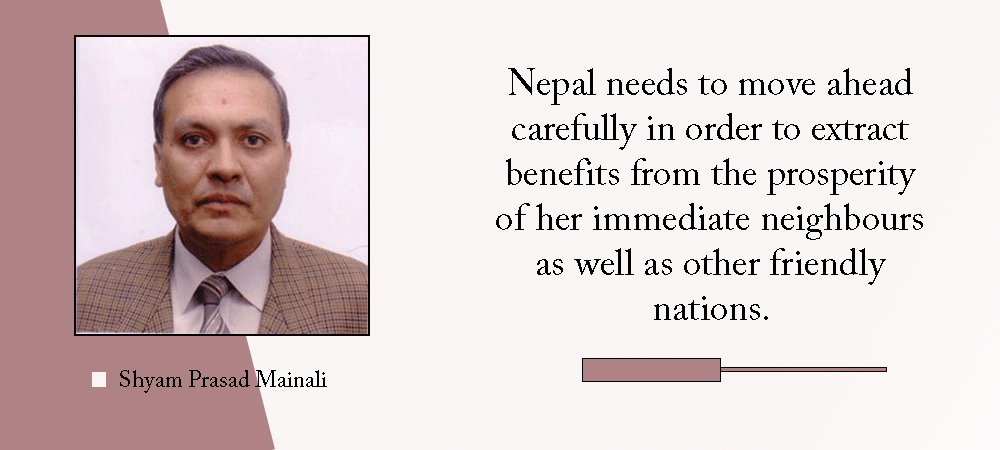- Friday, 20 February 2026
Challenges Of New Government
Results of the November 20 general elections have clearly indicated that the country may not have political stability as with no political party has gained a clear majority in the federal and provincial legislatures. This has created difficulties in the formation of a new federal government.
After prolonged negotiations, the new government, led by Chairman of the CPN-Maoist Centre Pushpa Kamal Dahal Prachanda, with the support of the CPN-UML and other fringe parties, has been formed. Like previous governments, this coalition has arisen out of careful negotiations on power sharing as opposed to an ideological similarity. This situation is likely to lead to issues such as promises not being kept and egos clashing.
Mixed poll system
Many believe that political instability, coupled with poor governance, has been a major obstacle to Nepal’s development. The provision of a mixed poll system that has been adopted for fostering political stability seems to have failed. Since the restoration of democracy in 1990, Nepal has fallen into the trap of political instability, resulting in the failure to deliver on policy.
The Nepali Congress-led coalition government before the election, and the opposition-led alliance each boasted that they would secure a majority from the 2022 elections to form a government. However, the newly-formed Rastriya Swatantra Party (RSP) and other anti-establishment parties such as Rastriya Prajatantra Party (RPP) undermined this claim and gained major traction due to the poor governance of mainstream parties.
Both NC and CPN-UML needed to form a coalition with other parties but the latter struck up a deal with the CPN-Maoist Centre. The smaller parties of RSP and RPP within the coalition will have major bargaining power and their election campaign opposed the corrupt and unstable gerontocracy that had hampered Nepal's progress.
Detractors were quick to point out the hypocrisy of these parties as they entered into a coalition with the very forces they opposed whilst campaigning for the elections. Proponents of these parties may suggest that due to their leverage over the mainstream parties of CPN-UML and CPN-MC, they have the potential to hold them accountable and curb corruption. Prachanda would be wary of this and would have to accept parts of their agendas despite ideological differences. However, the inverse may also be true as these parties forgo their ideological stances in exchange for power. The differences in outlook between these parties may also lead to further political instability.
Ideological differences means that parties might face difficulties in forging a consensus on policy formation as numerous problems are likely to arise. Negotiations with foreign powers on issues such as commerce and development need to be conducted. Conducive relations with India and China are a prerequisite for achieving the goal of a prosperous Nepal and attention needs to be given to maintaining sound and balanced relations with these neighbours.
Nepal also requires sustaining the existing multilateral relations, besides pursuing new ties. However, the nation’s donor-dependency as well as the weak economy limits foreign policy choices and diplomatic fronts. India is likely to be the most populated country within the next few decades. Similarly, China is likely to overtake the United States of America as the biggest economy in the world. Nepal needs to move ahead carefully in order to extract benefits from the prosperity of her immediate neighbours as well as other friendly nations.
The existence of a hung parliament is likely to weaken the new government. A review of the existing electoral system is desirable due to the fact that it can neither give a stable government nor control corruption. Since 2018, Nepal has formed several governments but remained unstable as the parties failed to maintain a majority.
It appears that Nepali politicians lack a coalition culture. They have to develop a culture of solidarity for a larger interest of the nation. Instability affects development activities and also deters foreign investors. The private sector is discouraged from investing in their business due to high risks in returns.
Political will
Different governments have collapsed over petty quarrelling over power sharing. To establish a stable government, the country should either go to a fully proportional system or directly elected executive head. To curb corruption, parties could delegate experts to run the ministries but there is no political will from the mainstream parties to do so.
Amidst such a fragile situation, the central government has been formed. Forming provincial governments may not be difficult. The nation will also get new President, Vice President, Chief Ministers, Speakers and Deputy Speakers. In such a fragile political situation, smaller parties deserve excessive bargaining power. These fringe parties have emerged as a decisive factor in the forming and dissolving of the government. Chances of frequent changes in government and squabbles among the political parties are inevitable. So, they should be prepared to tackle such challenges prudently.
The government needs to focus on maintaining good governance, achieving economic growth, and come up with a more pragmatic foreign policy. All the coalition partners are expected to prove their mettle by enacting policies that are of national interest.
(The author is former secretary of the government of Nepal.)















